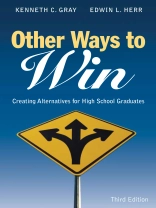Help teens in the academic middle succeed by creating and valuing other ways to win!
Research suggests that more than half of high school graduates are not academically prepared for college, yet they do not have significant learning disabilities preventing them from succeeding in a traditional classroom setting. This timeless bestseller, now in its third edition, has been updated with new data, recommendations, and observations to explore the choices available to these students beyond traditional four-year colleges.
Illustrating options that are more accessible and carry a much higher probability of student success, this resource:
- Dispels the 'one way to win’ myth
- Presents 'other ways to win’ that do not require a four-year college degree
- Provides benefits for students with alternate forms of post-high school education
All teens deserve to succeed regardless of the post-secondary educational path they take. Other Ways to Win can help make it happen.
Spis treści
Preface to the Third Edition
Preface to the Second Edition
Preface to the First Edition
Acknowledgments
About the Authors
Part I. The One Way to Win Myth
1. The One Way to Win Myth
2. Recognizing the Forces Behind One Way to Win
3. Limited Options for Special Populations
Part II. Counting the Losers in the One Way to Win Game
4. Questionable Academic Preparation
5. Winners and Losers in the One Way to Win Game
6. Who Cares? The Politics of Average Students
Part III. Creating Other Ways to Win
7. The High Skill/High Wage Rationale
8. Step One: Providing Systematic Career Guidance for Students and Structured Feedback for Parents
9. Step Two: Redesigning the High School Academic Curriculum
10. Step Three: Ensuring Equal Status and Focused Academics
11. Other Ways to Win and Success for All
References
Index
O autorze
Edwin L. Herr is Distinguished Emeritus Professor of Education (Counselor Education and Counseling Psychology) and Emeritus Associate Dean, College of Education, Pennsylvania State University. He received his BS degree in Business Education from Shippensburg State Teachers College (Now Shippensburg University), and an MA and Ed D in Counseling and Student Personnel Administration from Teachers College, Columbia University, where he was an Alumni Fellow. A former business teacher, school counselor, and director of guidance, he previously served as Assistant and Associate Professor of Counselor Education at the State University of New York at Buffalo (1963-1966) and as the First Director of the Bureau of Guidance Services and the Bureau of Pupil Personnel Services, Pennsylvania Department of Education (1966-1968). The author or coauthor of more than 300 articles and 32books and monographs, he is Past President of the American Counseling Association, Past President of the National Vocational Guidance Association, and Past President of the Association for Counselor Education and Supervision. He has been elected a Fellow of the American Psychological Association, the American Psychological Society, the American Association for Applied and Preventive Psychology, and the National Career Development Association. Among his many awards, he has received the Eminent Career Award of the National Career Development Association, the extended research award from the American Counseling Association, and the Counseling Innovation and Vision Award of the Association for Counselor Education and Supervision.












